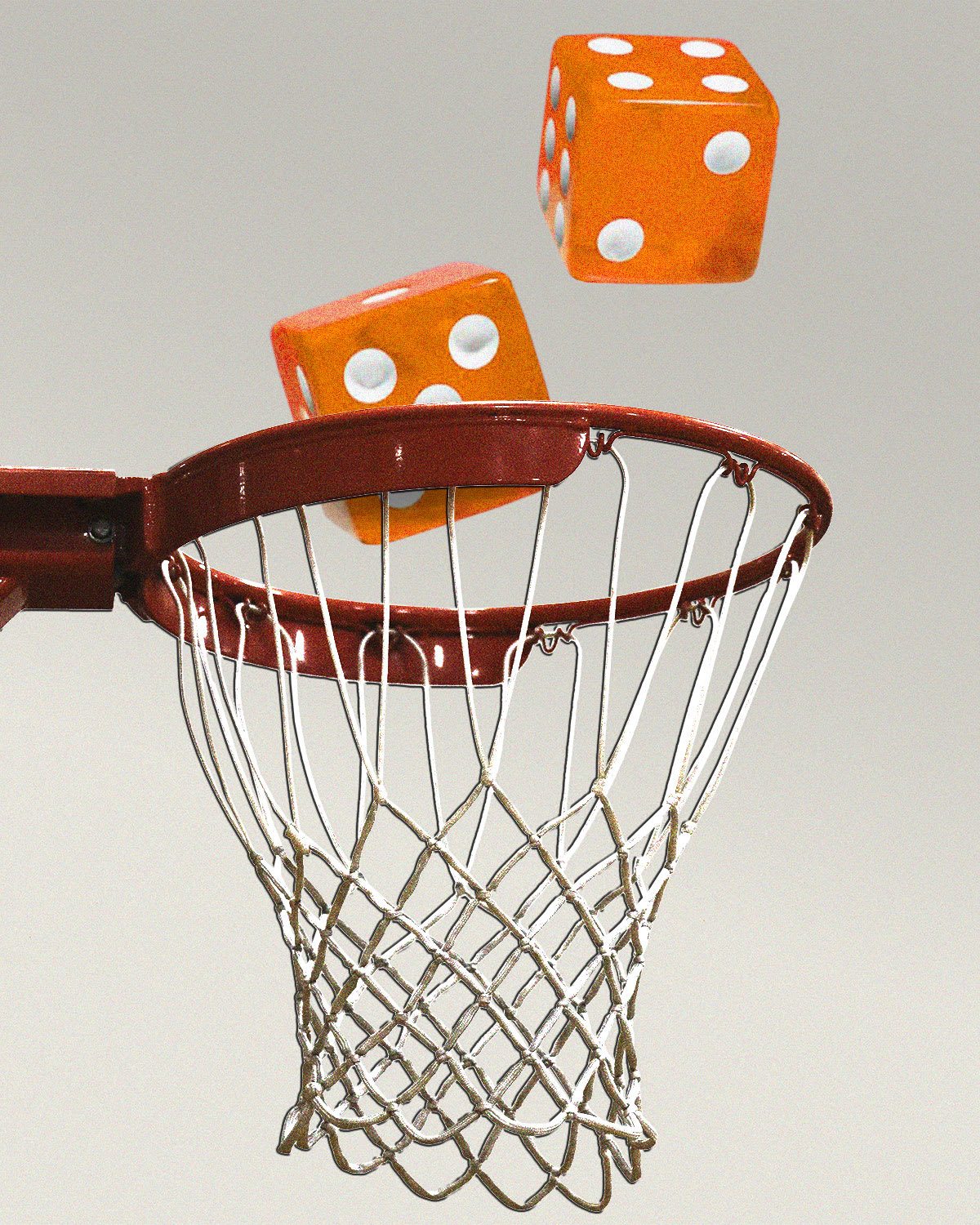Sports betting: The basics
In this year's March Madness, filling out a prophetic bracket isn't the only way to make a buck.
Sports betting is now legal in eight states and arriving in more states soon. It's a seismic shift in the landscape of sports gambling. Until recently, if you wanted to bet on a sporting event, you had to visit Sin City or find an illegal bookie, which plenty of people did.
During last year's NCAA tournament, only about 3 percent of bets were placed legally, according to the American Gaming Association — a paltry fraction of the $10 billion in gambling that March Madness generated.
This week on 60 Minutes, correspondent Jon Wertheim reports on the new era of sports betting and its impending impact — including the potential risk to the integrity of games, particularly college sports.
If you're new to the world of sports betting and thinking about make a wager, here is a primer:
Sports betting: What's changed?
Last May, the Supreme Court ruled as unconstitutional the Professional and Amateur Sports Protection Act, or PASPA. The federal law had essentially limited sports betting to Nevada for more than 25 years. The Supreme Court ruling leaves it up to states to decide whether to allow their residents to bet on sports.
New Jersey, which filed the lawsuit that produced the Supreme Court ruling, led the way, and several states followed. Sports betting — both on professional and college games — is now legal in eight states.
In 2014, NBA Commissioner Adam Silver wrote an op-ed calling for the legalization and regulation of sports betting. Still, he told Wertheim, he was surprised by the Supreme Court's decision.
"I wasn't expecting that ruling to come," he says in the clip above. "I think once it did, states saw an opportunity to generate more tax revenue, I think, to regulate a market that was clearly operating, but in an opaque way."
Another change? Silver's NBA was one of the professional leagues to quickly shift its position on legalized sports betting. Prior to the Supreme Court's decision, most sports leagues wanted to keep gambling on their teams illegal. But within months of the ruling, the NBA, MLB, and NHL all made deals with MGM Resorts, and the NFL partnered with Caesars Palace.
How do you place a sports bet?
If you're in one of the eight states where sports betting is now legal — or one of the states where legalization is likely coming soon — how do you place a bet?
The answer depends on the rules for the individual state. Some states, like New Jersey and West Virginia, permit location-specific mobile apps, giving bettors the ability to place bets from their phones in real-time as they watch a game from anywhere, including in the stands.
Fantasy sports giants FanDuel and DraftKings both added sports betting mobile apps, and they've also opened sportsbooks in New Jersey and Mississippi, respectively. Think of a sportsbook as a sports bar where you can also legally place bets on various sporting events.
Some states don't allow mobile betting, so gamblers there have to go to a casino to bet.
What kind of bets can you make?
Football and baseball, wrestling and overseas soccer, college and professional — just about every sport can now be bet on. And while it used to be that a gambler needed to have locked in a wager before the start of play, that's not the case anymore.
Today, people can bet on multiple aspects of every game as it's happening, not just whether a team will win or lose. It's called in-play betting. For example, a bettor can place a wager on whether or not a team will have more than 20 points in a quarter, and more exotic bets — like whether Steph Curry will make or miss his next 3-point shot — are expected to be coming soon
"It's the gamification of sports," Silver said.
Will sports betting increase gambling addiction?
With all the sports bets a person can now place — and the ease with which they can do it — one aspect of sports betting that its proponents don't talk about much is the potential increase in gambling addiction.
Anderson Cooper has reported on 60 Minutes about why people have become hooked on their phones, apps, and social media. App designers are already designing their products to be habit-forming — and that's without the possibility of a big pay day. Mobile betting apps will now place gambling literally at your fingertips, potentially with push notifications to remind you that your favorite team is playing.
Ryan Rodenberg, a law professor at Florida State with a specialty in sports gambling, told 60 Minutes that other countries with legalized sports gambling have had issues with gambling addiction.
"Massive gambling addiction issues, where people are declaring personal bankruptcy and stealing from others," Rodenberg said. "And that's something that needs to be tracked."
Will sports betting change the fan experience?
Rodenberg has another warning for the impending onslaught of sports betting: prepare for it to change the fan's viewing experience.
From a deluge of gambling-related advertisements to betting elements likely incorporated into the broadcast, Rodenberg envisions a subset of fans tuning out.
"The infusion of sports betting into the way that American consume sports, it'll be unlike what we've seen before, probably since the advent of television," Rodenberg said.
Glossary of sports betting terminology
Action — Any money bet on a game or race
Against the Spread (ATS) — Betting on the underdog side of the point spread. For example, if you bet Maryland +5, and they lose by only 4, you win your bet, even though the team you bet on lost the game
Betting line or line —The odds or point spread
Book — Short for sportsbook or bookmaker. A person or establishment that takes bets from customers
Cover — The betting result on a point-spread wager. For a favorite to cover, it has to win by more points than the odds expected them to. For example, if Duke is a 2.5 point favorite (-2.5) and wins by 3 points, then they have covered the spread
Even money — Odds are considered 50-50. You put up $1 to win $1
Favorite — The team that is expected to win straight-up
Handle — The total amount of money wagered
In-play bet — Wagering while the sports event is still in action. For example, bettors can place a wager on whether a team will have more than 20 points in the quarter, or whether a particular basketball player will make or miss his next 3-point shot. Odds are constantly changing during the game
Moneyline — A bet on who will win the game, no matter what the spread is. A bettor simply has to pick the right team to win
Odds — The ratio used as the basis of a bet. For example, say the odds are 3 to 1 that the Ravens will beat the Browns. If you bet $1 on the Browns, and the Browns win, you get paid $3
Over/under — A bet based on the total number of points scored by both teams in a game
Parlay — A wager that combines bets on multiple teams. For the wager to pay out, all the teams must win/cover
Point spread or spread — The number of points by which the favorite is expected to score more than the underdog. The favorite will have to win by more than the margin the oddsmakers set. For example, if the Yankees are favored by 2.5 against the Red Sox, they need to win by 3 runs or more in order for people who bet on them to have a payout. If they only win by 2, they didn't cover the spread, and those who bet on the Red Sox will win
Proposition or prop bet — A bet made about whether or not something will happen during a game that has no bearing on the final outcome of the game. A prop bet might be whether the first pitch is a ball or a strike, or how many rushing yards a running back has in a game, or whether a particular player will score the first points in a game
Push — A bet that results in a tie based on the spread. If the Giants are favored by 7 and win 21-14, neither team won. The bets are returned
Straight up — The expected outright winner of the moneyline, regardless of the point spread
Teaser — A type of parlay bet that allows the bettor to combine bets on different games and move the point spread in his or her favor. All games have to be picked correctly to win, and it results in a lower payout
Underdog — The team that is expected to lose straight up
Vig or juice — The commission or percentage of the betting pool the house (sportsbook) takes
Wager — A bet
Credit: ESPN
To watch Jon Wertheim's 60 Minutes report on sports betting, click here.




